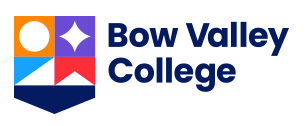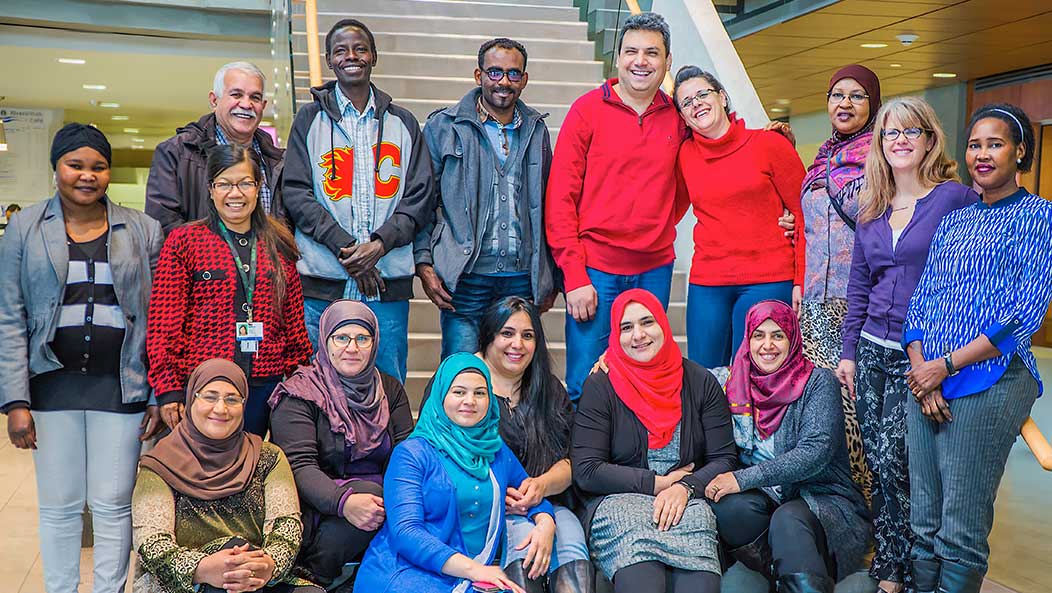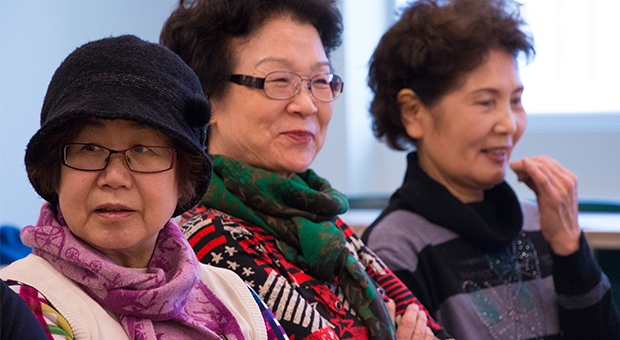Phases
Project Description
Enhancing Wellbeing and Civic Engagement of Immigrant Women Retirees is a two-year SSHRC-funded Community and College Social Innovation Fund project.
Bow Valley College and the Calgary Immigrant Women’s Association (CIWA) partnered to investigate the critical barriers and available supports for retired immigrant women.
Dr Martha Fanjoy and her team worked collaboratively with research participants and partners to co-create a community-delivered program focused on immigrant women retirees’ wellbeing and engagement.
Recruited with CIWA’s support, individual participants were women who had been retired for a minimum of two years who were employed for a minimum of three consecutive years after arriving in Canada.
By engaging with a significant yet overlooked sector of an aging population, the research raised awareness about the needs and potential of retired immigrant women and to create strategies to promote their civic engagement.
The research process and results helped immigrant-serving agencies and community organizations working with seniors to develop, plan, and implement programs for immigrant women. Further, service providers were able to use, replicate, and adapt the co-creation program strategy, methods, and tools in order to address a number of broad social concerns.
The project’s scholarly outcomes were grounded in the principles of social innovation, participatory program design, and developmental evaluation. In addition to supporting programming and policy specific to older immigrant populations, Enhancing Wellbeing and Civic Engagement of Immigrant Women Retirees speaks to the intersectional vulnerabilities of being a woman, immigrant, and senior while significantly contributing to the limited knowledge base on retired immigrant women in Canada.
Phase I
Current research about the impacts of immigration on aging is sparse, especially in Canada in spite of simultaneously experiencing a rapidly growing population due to immigration and a broadly aging population creating a new demographic of immigrant seniors.
The data collection phase of Enhancing Wellbeing and Civic Engagement of Immigrant Women Retirees addressed the gendered experiences of immigrant women seniors. It provided a foundation to address the need for an innovative, integrated approach to seniors which acknowledges their strengths, diverse cultural backgrounds, socio-economic contexts, gender differences, and immigration experiences.
Phase I – Data Collection Milestones
(July 2016– February 2017)
- Research team hired and trained
- Literature review complete
- Data collection: i) 25 in-depth interviews with immigrant women retirees, followed by targeted participant observation and ii) 13 stakeholder interviews
- Data Analysis: i) Participant interviews transcribed and ii) Interview coding in progress
- Knowledge Dissemination: i) Presentation to University of Calgary Faculty of Social Work Age Friendly Communities Class (January, 2017), ii) Brown Bag Lunch presentation at Bow Valley College (February, 2017), and iii) Presentation at the annual Metropolis Conference (March, 2017)
Initial analysis of the collected data revealed the importance of applying an intersectional lens to ensure that the challenges and contributors to wellbeing raised by the women interviewed are never considered to be the result of single, distinct factor.
Being mindful of an intersectional lens reminded researchers to move beyond static, homogenizing categories of “immigrant “and “women” to analyse how these identities intersect and overlap with other factors such as ethno-cultural background, language skills, education, employment history, year of immigration, and family composition. Extending beyond the individual experience, this early insight asked the research team to consider how these factors intersect and interact with the existing structures and systems that impact immigrant women retirees’ daily lives. By exploring how these intersecting factors shape individual and group experiences, the research team recommended policy and programs with outcomes designed to improve and sustain the well-being of immigrant women retirees.
Transitioning to Phase II included working with a smaller group of participants to co-learn from the research findings and experiences to co-create a community-based initiatives.
Phase II
In the spring 2017 Dr. Martha Fanjoy and her Enhancing Wellbeing for Immigrant Women Retirees team turned their attention to phase two of the research project: working with participants to co-learn from the research findings and experiences to co-create a community-based initiative.
In addition to their active research throughout the spring, the team held two events in June with an aim to share their early findings with community and campus stakeholders: a World Café conversation with community service agencies and a poster presentation for Bow Valley College faculty and staff.
Coinciding with an annual provincial-wide seniors’ initiative during the first week of June, the Seniors’ Week World Café invited participants from a wide-cross section of community agencies to participate in a world café-style discussion. Over 40 attendees considered immigrant women’s transition to retirement, access to services and supports as they age, and factors that inhibit or enable social participation in a series of conversations led and captured by the research team throughout the morning session.
On June 15, 2017, working with two other Bow Valley College SSHRC-funded research teams, the team participated in campus’ inaugural research poster presentation, Research in Action. Nearly 80 colleagues attended the lunch-hour reception. The showcase saw the team share their early insights and demonstrate how their work not only answers important questions but actively contributes to teaching and learning on campus while fostering connections with community partners.
Thanks to participants’ contributions at both events, the team continued to work toward mobilizing the programming and policy aspects of the project and ignite meaningful connections between publicly-funded research and operational practices of community stakeholders.
As the summer progressed, the project continued to explore co-creation with participants while concurrently engaging in development evaluation to inform the program’s progress and outcomes.
Project Newsletters
- Vol 1: October 2016 The Project – Why Immigrant Women Retirees?
- Vol 2: February 2017 Early Findings – Reinforcing the Importance of Intersectionality
- Vol 3: June 2017 Preliminary Findings Snapshot – Retirement Planning
- Vol 4: October 2017 From Research to Practice Co-creation with Research Participants
- Vol 5: February 2018 Civic Engagement Knowledge Exchange
Reports
- Phase One Report - August 2017
- Phase Two Report - February 2018
Academic Journal Articles (Peer Reviewed)


